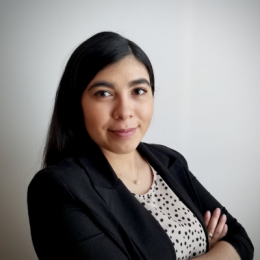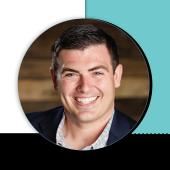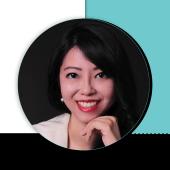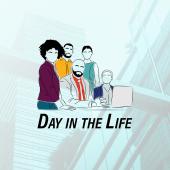The ACC Top 10 30-Somethings awards recognize in-house counsel between the ages of 30 and 39 for their innovation, approach to challenges, well-rounded perspectives, contributions to the in-house community, and pro bono and volunteer work.
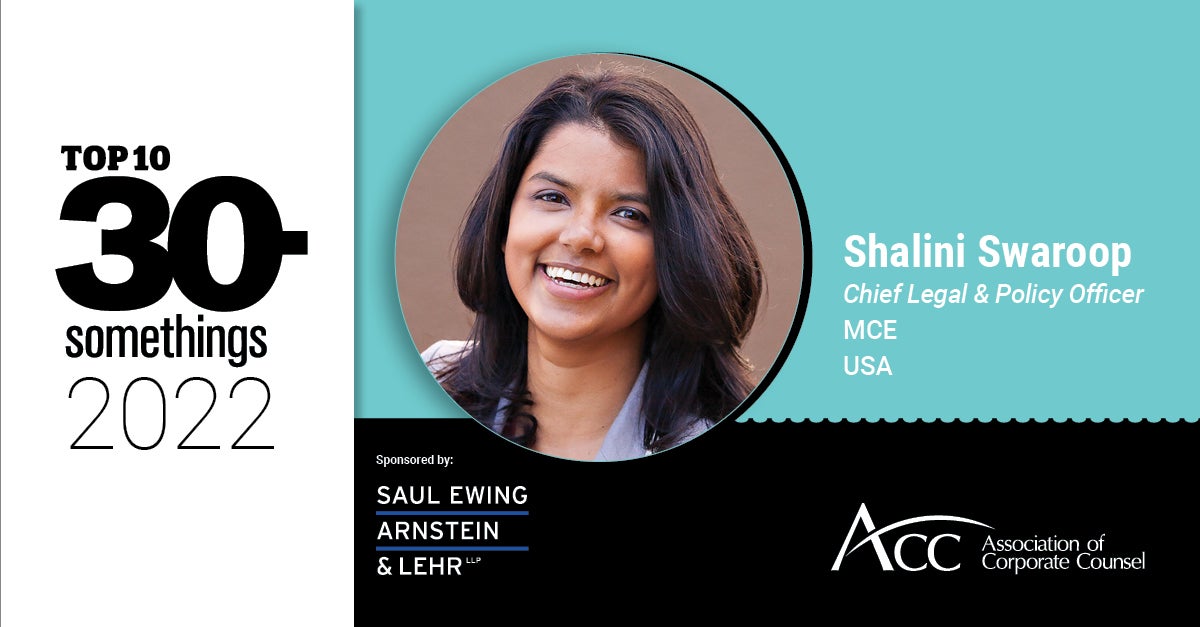
“My passion for social justice comes out of my empathy towards other people,” shares Shalini Swaroop. As chief legal and policy officer of MCE, the first community choice energy agency in California, Shalini oversees all of the non-profit’s equity policy work. “We have work that focuses on low-income folks, people who live in environmental justice communities, medically vulnerable people who need electricity for medical devices to live,” she explains. “I’m involved with the agency-wide strategy determining how we’re building equitable communities.”
“My passion for social justice comes out of my empathy towards other people.”
- Shalini Swaroop
Shalini’s experience advocating for minority and low-income communities with the National Diversity Coalition spurred MCE to recruit her. “MCE wanted somebody who had experience representing low-income communities and communities of color in front of the public utilities commission,” she says.
During her first week, Shalini suggested highlighting low-income programs on the website to increase community awareness about their offerings. “MCE said, ‘Great, we’ll do it right now,’” Shalini recalls. “I think that was so indicative of the MCE culture. I really appreciate results and fast movement, and the CEO is also a social justice advocate, so I felt very comfortable.”
Many roles at MCE later, Shalini continues to introduce new ideas. In response to the opportunity to partner with Chevron to build a solar farm on a remediated brownfield site, Shalini created the MCE Community Power Coalition to involve local organizations in the decision.
“We said we think this is a good deal, but we won’t move forward if you say no.” She stresses: “It’s their lives, their homes, their families, and their communities.” Coalition members, made up of social, racial, and environmental justice organizations, supported the partnership and participated in negotiations. Members continue to devote resources to upholding the founding principles Shalini drafted:
- Expanding access to renewable energy services;
- Accelerating the transition to a clean energy future through workforce and development training; and
- Developing inclusive programs and policies at MCE.
During the pandemic, Shalini was instrumental in transitioning MCE’s 70-person staff to remote work in time for the stay-at-home orders. She shared the telecommuting agreements, remote work guidelines, and checklists as templates to sister agencies and the ACLU of Northern California, where she was serving as vice chair of the board of directors. Sharing the templates enabled more than 20 organizations in California with limited in-house legal teams to fully comply with the stay-at-home orders.
She also implemented software solutions to streamline and optimize workflows that have benefited the legal team and company by reducing contract turnaround times and quantifying impact. “At the end of every quarter, we capture how many legal inquiries we responded to and what units were they from. It’s helped better illustrate what we do,” she says.
Outside of MCE, Shalini’s environmental justice advocacy takes many forms. State Senator Scott Wiener appointed her to chair the Power Subcommittee for the Citizens’ Advisory Committee of the San Francisco Public Utilities Commission. In her role, she oversaw the launch and implementation of San Francisco’s community-based renewable energy program. Her town council also appointed Shalini to a position on the Climate Action Commission, charged with promoting sustainability efforts there.
"My mentorship centers around trying to undermine imposter syndrome. I see so many people not owning their skills, what they bring to the table, or their value."
- Shalini Swaroop
Over the past decade, Shalini has seen interest in her niche field grow. “It’s been so great to mentor and bring up a generation of clean energy professionals in California,” she shares. “My mentorship centers around trying to undermine imposter syndrome. I see so many people not owning their skills, what they bring to the table, or their value.” Similar feelings motivated Shalini to co-found the Bay Area Woman of Color Attorney Network. “The best thing to come out of that was just an understanding that we’re not alone. It was really important to create that community,” she says.
Her efforts to increase diversity in the profession include speaking on the topic at statewide conferences for utility attorneys and encouraging Asian American college students to apply to law school through the Pre-Law Diversity Conference (formerly Legally Asian), a recruitment program at Hastings College of Law. Shalini also served on the South Asian Bar Association of Northern California board as the civil rights and endorsements chairs, addressing critical civil rights issues in the South Asian community and providing endorsements for judicial candidates.
Reflecting on her path, Shalini admits, “I would have never thought I was going to be a clean energy attorney.” She attended Berkeley School of Law with a plan to practice human rights law, focusing on women’s rights. But she would say to her past self: “Be open. Energy is an industry that’s constantly evolving and changing, so there’s no going back. We focus on environmental equity ensuring that frontline communities who have borne the brunt of the fossil fuel industry are the first to benefit from the renewable energy economy. It’s been a lot more social justice work than you would think.”
Q&A with Shalini Swaroop
Where does your passion for social justice stem from?
The shooting at Columbine High School was 20 minutes from where I grew up — and where my parents still live. It really ignited this fire in me. If that kind of pain can cause this kind of violence, I want to make sure that every student has a right to a safe education. I began volunteering with Youth Celebrate Diversity, a Colorado-based organization conducting youth diversity conferences throughout the Southwest, and now I serve as a board member.
How do you practice self-care?
I go for a hike. I live a mile from 40,000 acres of trails, so I'm up on the trails whenever I have a long conference call. When there’s a thorny issue that I’m working out, and I’m hiking up a big hill, it takes some steam out of any frustration I may feel. You have to embed self-care into your work because it can’t be “I do this during the day and this at night.” It has to be integrated throughout. For example, if you don’t want to be on camera, don’t be on camera. I think that’s a pressure we have put on ourselves, but why, for what, and for whom?
Disclaimer: The information in any resource in this website should not be construed as legal advice or as a legal opinion on specific facts, and should not be considered representing the views of its authors, its sponsors, and/or ACC. These resources are not intended as a definitive statement on the subject addressed. Rather, they are intended to serve as a tool providing practical guidance and references for the busy in-house practitioner and other readers.

